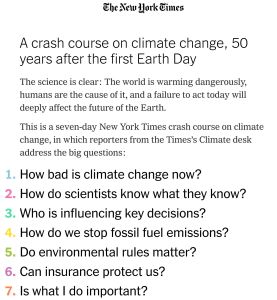Wondering how big the problem of global warming is, say, compared to the novel coronavirus? Wonder no more. This compelling summary of climate science and policy makes it clear that the world is currently on a path to catastrophe, but quick and strategic changes can minimize harm. From making personal choices that reduce greenhouse gas emissions to supporting policies that incentivize emissions-curtailing societal changes, seven concise, though somewhat scattershot, Q&As make it clear what people can – and must – do to head off an environmental and economic crisis of pandemic proportions.
Climate change is happening and it’s a serious problem.
As concentrations of carbon dioxide and other greenhouse gases increase in the atmosphere, Earth’s climate is changing, creating a cascade of disruptions to the planet.
Ocean temperatures are rising. Storms and heat waves are becoming more severe. A warming Arctic is altering the jet stream, creating more extreme weather in temperate latitudes. Melting ice is creating positive feedback loops that cause more ice to melt and altering ocean salinity and circulation patterns. The past decade was the hottest on record.
Scientists learn about climate change through direct observation and clues from the past.
Scientists can learn about climate change from straightforward observation of the rising temperatures in the air and the ocean.
They can also look at the history of climate recorded in the rings of trees and samples of ice taken from the Arctic. Carbon dioxide from burning fossil fuels is slightly different from carbon dioxide produced by living plants and other sources, so scientists know that the increased concentration in the atmosphere is due to humans.
...
Henry Fountain, Kendra Pierre-Louis, Hiroko Tabuchi, Brad Plumer, Lisa Friedman, Christopher Flavelle and Somini Sengupta are reporters for The New York Times climate desk.

















Comment on this summary